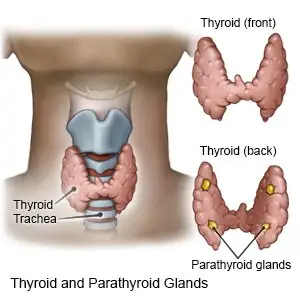What is myxedema coma?
Myxedema coma is a severe form of hypothyroidism (low thyroid function). Myxedema coma occurs when thyroid hormone levels are not treated or controlled. Thyroid hormones help control body temperature, heart rate, growth, and weight. Myxedema coma can be triggered by not taking medicine to treat hypothyroidism. It may also be triggered by an infection, medicine, or a sudden stressful event, such as trauma or surgery.
 |
What are the signs and symptoms of myxedema coma?
The person will have signs and symptoms of hypothyroidism, such as fatigue, weight gain, constipation, and feeling cold all the time. He or she may also have any of the following:
- Puffiness or swelling, especially around the eyes
- Swelling in his or her arms or legs
- Confusion or memory loss
- A slow and irregular heart rate
- Trouble breathing
- Seizures or coma
How is myxedema coma diagnosed?
Healthcare providers will check the person's reflexes and alertness. They will also do blood or urine tests to check for hormone levels, signs of infection, and to get information about the person's overall health. Other tests may be needed to check the person's heart and lungs and to find the trigger of the myxedema coma.
How is myxedema coma treated?
Healthcare providers will give the person medicine to increase thyroid hormone levels. Medicine may be given to decrease seizures. Healthcare providers will also treat the condition that triggered the myxedema coma. The person may also need extra blankets for warmth, a machine to help with breathing, or an IV for nutrition.
Treatment options
The following list of medications are in some way related to or used in the treatment of this condition.
- levothyroxine
- Synthroid
- Levoxyl
- Tirosint
- Cytomel
View more treatment options
When should I contact the person's healthcare provider?
- The person has a fever.
- The person develops new symptoms.
- The person has a sore that does not heal.
- You have questions or concerns about the person's condition or care.
When should I seek immediate care or call 911?
- The person faints or has a seizure.
- The person has chest pain or sudden trouble breathing.
- The person has swelling in his or her face, arms, or feet.
- The person has trouble thinking clearly or becomes very weak.
- The person's lips or fingernails are blue or white.
- The person's signs and symptoms return or become worse.
Care Agreement
You have the right to help plan your care. Learn about your health condition and how it may be treated. Discuss treatment options with your healthcare providers to decide what care you want to receive. You always have the right to refuse treatment. The above information is an educational aid only. It is not intended as medical advice for individual conditions or treatments. Talk to your doctor, nurse or pharmacist before following any medical regimen to see if it is safe and effective for you.© Copyright Merative 2023 Information is for End User's use only and may not be sold, redistributed or otherwise used for commercial purposes.




